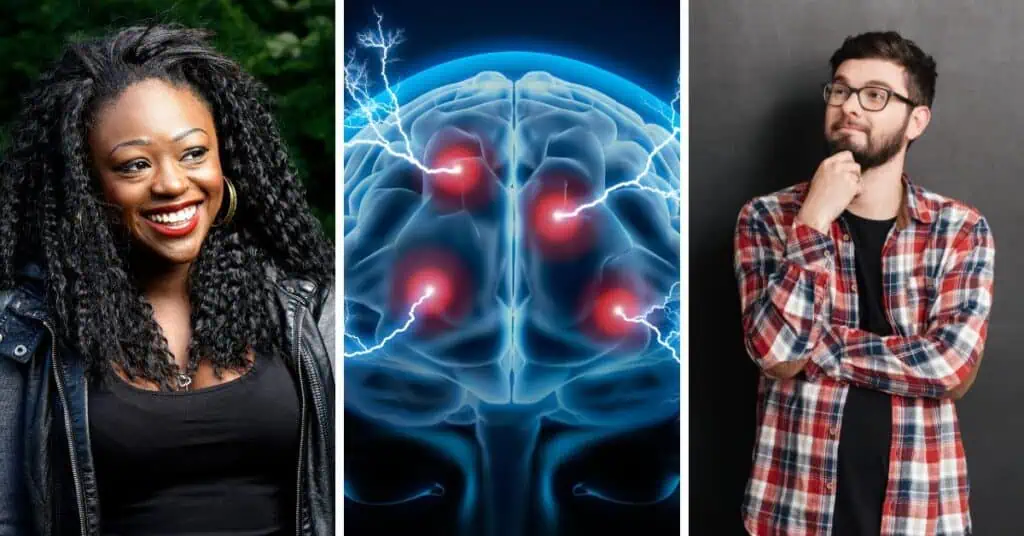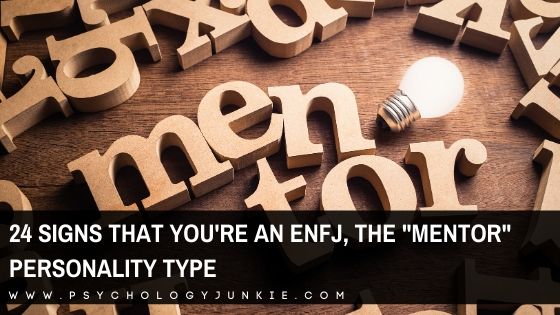ENFJ Personality Type: The Complete Guide
ENFJs are known for their unique ability to inspire people and bring about positive change in communities and cultures. They are deeply insightful about the human condition and have a knack for seeing into each individual’s unique potential. They are often called The Givers or The Protagonists because they believe so strongly in compassionately serving the human race and improving the world. These personality types use a combination of Extraverted Feeling (Fe) to empathize and relate to others, as well as Introverted Intuition (Ni) to form insights about the future and grasp underlying patterns and themes. If you look up many of our great motivational leaders and teachers you will find a host of ENFJs; people like Martin Luther King Jr., Nelson Mandela, and even Oprah Winfrey!
Linda Berens, a psychologist and author of The 16 Personality Types: Descriptions for Self-Discovery, says this of ENFJs: “For Envisioner Mentors (ENFJs), life is a process of succeeding at relationships. There can never be enough truly empathic relationships to foster mutual growth. They enjoy the creative process in many forms and often bring a fresh view to projects they enthusiastically work on. Realizing dreams – their own and others’ – is what life is all about.”

Not sure if you’re an ENFJ, or perhaps a different personality type? You can take our personality questionnaire here. Or you can take the official MBTI® here.
Estimated reading time: 12 minutes
What Does ENFJ Stand For?
E = Extrovert. “I gain energy from the people and things around me. I look to the outer world before looking inward to reflections and subjective ideas.”
N = iNtuition. “I focus more on the abstract or potential of something than the concrete or existing reality.”
F = Feeling. “I apply personal values and empathize in order to make a decision. I want what is best for the group or humanity as a whole.”
J = Judging. “I like having things settled, decided and structured. I prefer to get my work and responsibilities taken care of before I play or relax.”
ENFJ Motivations and Weaknesses:
- Driving Force: To understand and work with people to create unified direction and harmonious, shared values.
- Backup Strength: To understand the “dance of the universe.” To see the underlying meaning of all things and predict the future.
- Weaknesses: Can sabotage themselves by looking to others’ needs before their own. May disregard logic in favor of maintaining good connections with people. Can lose touch with details and surface realities by looking for a deeper meaning.
- Stressors: Lack of positive interactions, too much time alone, chaos, procrastination in themselves or others, having to focus on nitty-gritty detailed work, conflict, or criticism.
How Rare Are ENFJs?
According to the latest MBTI® Manual, ENFJs are the second-rarest personality type. In fact, they only make up 2.2% of the population.
ENFJ Personality Traits and Strengths:
While people vary based on their background and their Enneagram type, people who prefer Extroversion, Intuition, Feeling, and Judging often have the following characteristics:
- Good at organizing people for overall harmony and unity
- Friendly and persuasive
- Charismatic and inspiring
- Big-picture thinkers
- Readily empathize with others
- Easily notice societal expectations and standards
- Enjoy discussing philosophical, meaningful, even controversial subjects
- Prefer being scheduled and having a plan to “winging it”
- Crave regular social interactions
- Skilled at anticipating the future effects of current experiences.
- Read people easily
- Intellectually curious
- Gifted at reading between the lines
ENFJ Weaknesses and Struggles:
ENFJs, like all personality types, have their own unique set of challenges due to their specific cognitive function stack. Here are some of the struggles commonly faced by ENFJs:
- High Expectations: ENFJs often set very high standards for themselves and others. This can lead to feelings of disappointment or frustration if these standards are not met.
- Overextending Themselves: Because ENFJs are naturally inclined to help others, they often find themselves stretched too thin, trying to be there for everyone at the expense of their own health and well-being. It’s important for them to remember and prioritize their own needs, rather than getting stuck in a cycle of self-forgetting.
- Struggle with Criticism: ENFJs, being highly empathetic and sensitive to others’ emotions, might find it challenging to handle criticism or negative feedback.
- Difficulty Saying No: Their desire to be helpful and supportive can make it hard for ENFJs to say no, even when they should.
- Overthinking:ENFJs’ ability to foresee potential issues can sometimes lead them to overthink situations, causing unnecessary stress and anxiety.
- Neglecting Personal Needs: In their quest to cater to the needs of others, ENFJs may neglect their own personal needs, leading to burnout or feelings of resentment.
- Difficulty Handling Conflict: ENFJs aim for harmony in their relationships, and as such, they might struggle with managing conflict, often avoiding it rather than addressing it head-on.
Understanding these struggles can lead to better self-awareness for the ENFJ and provide insights for others on how to better relate to and support the ENFJs in their lives.
ENFJ Careers
For ENFJs, job satisfaction means getting three things: Variety, Creativity, and Teamwork. They thrive when they are able to develop creative solutions to people’s problems and use their empathy to connect with others. Whether they’re counseling, inspiring, or comforting, they want their work to benefit humanity in some way. As extroverts, they want a work environment that allows them to interact with a variety of people and be part of a team. They crave frequent exposure to new ideas, challenges, and perspectives. Juggling several projects at once is exciting to them as long as they have a supportive team at their side and a sense of order and control. They want to feel like they’re being a catalyst and improving the world, one person at a time. Regular feedback is important to them.
Career Suggestions:
- Public Relations Expert
- Social worker
- Journalist
- Life Coach
- Guidance Counselor
- Human resources
- Teacher
- Sociologist
- Holistic Health Practitioner
- Eco-tourism specialist
- Travel consultant
- Religious Teacher
- Therapist.
Famous ENFJs:
We have to tread carefully when we type any celebrity. After all, we can’t exactly sit down with Martin Luther King Jr. and conduct a questionnaire! But based on the work of myself and other typologists we believe that the following influential people had the ENFJ personality preferences:
- Rashida Jones
- Martin Luther King Jr.
- Nelson Mandela
- Johann von Goethe
- Joe Biden
- Justin Trudeau
- Tony Blair
- Daniel Goldman
- Alfred Adler
- Erich Fromm
- Maya Angelou
- Neil deGrasse Tyson
- Oprah Winfrey
- Bono
- Kate Winslet
- Bradley Cooper
- Dakota Fanning
- Emma Stone
- AnnaSophia Robb
- Dr. Drew

Sometimes fictional characters with our personality types help us to recognize and identify how type can show up in a more relatable way! While fictional characters can definitely be exaggerated, they’re a fun way to explore type with your friends or on your own. Some popular ENFJ characters include:
- Peeta Mellark from The Hunger Games
- Neil Perry from Dead Poets Society
- Tanjiro Kamado from Demon Slayer
- Diana Prince from Wonder Woman
- Morpheus from The Matrix
- You can find more in our article about ENFJ fictional characters. We even have an article solely dedicated to ENFJ anime characters!
ENFJ Relationships:
When it comes to relationships, any type can be happy with any other personality type. If you’re an ENFJ, there are various upsides to a relationship with any of the 16 personality types. Typically, ENFJs prefer relationships that they can see as going somewhere in the future. They don’t want to spend a lot of time and energy on someone only for it to be a fling or something trivial. Depth and a meaningful connection mean so much more to them than a fun one-night stand.
Judgers can get along well with ENFJs because they tend to map things out, take relationships seriously, and plan for the future. Sensors can be good for ENFJs because they balance their intuition with a more grounded, practical outlook on life. Intuitives can be like-minded souls for ENFJs because together they can explore abstract concepts and far reaching insights into the future. Thinkers can be the counterbalance to ENFJ’s deeply feeling, empathic side. Feelers can connect with ENFJs on a raw, emotional level and understand their decision-making more easily. Perceivers may help ENFJs to shake things up, go with the flow, and find the fun in spontaneity! As you can see, there are pluses to literally any relationship combination you can think of.
Some people like to say that there is an “ideal” type for every Myers-Briggs® personality type. Instead, I like to look at each person as an individual regardless of their type. Some ENFJs will want a spontaneous, free-spirited Feeling-Perceiving type. Others will find comfort in the grounded, stable nature of an STJ type. What you prefer is largely up to your unique values, life experiences, and special tastes.
The Mentor as a Partner
ENFJs are often the warmest, most compassionate, and friendliest individuals in any room. They are tuned into the emotional frequencies of those around them, often intuitively anticipating their significant other’s needs. They have an intrinsic desire to understand what makes their partner truly unique and are always ready to lend their support in the journey of self-discovery.
Communication is their forte. An ENFJ is often diplomatic, tactful, and seamlessly capable of inspiring those around them. Their goal is to avoid offending others, and their words usually serve as a bridge, not a barrier.
In a relationship, an ENFJ will go to great lengths to please their partner, often putting the needs of others before their own. They are like personal cheerleaders, urging their partners towards higher personal and professional heights, all the while ensuring they feel supported and encouraged.
But ENFJs need support as much as they give it! In relationships, they crave appreciation, words of affirmation, and acknowledgment of their efforts. It’s crucial for them to feel heard, supported, and emotionally connected.
For example, an ENFJ may surprise their partner with a thoughtful gift that signifies an intimate shared memory, or they might plan a day around their partner’s favorite activities, showing through action their deep understanding and care. They thrive when they can explore deep emotional concepts and levels of intimacy, anything less might leave them unfulfilled and unsatisfied.
However, ENFJs have their relationship dissatisfiers as well. A relationship with secrets, coldness, and unwillingness to explore deep emotional landscapes can leave them feeling empty.
ENFJ Cognitive Functions:
The ENFJ’s cognitive functions are a fascinating blend of outward empathy and inward intuition, which contribute to their charismatic and inspirational nature.
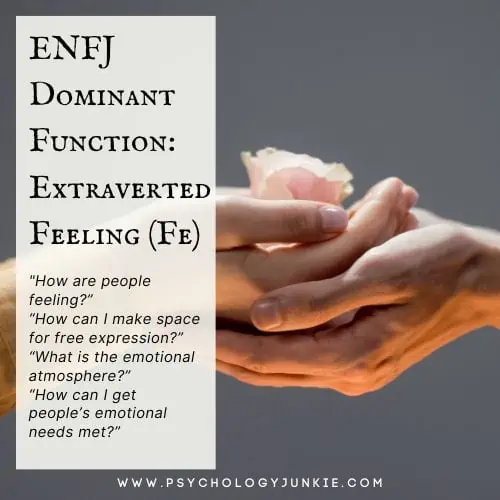
Dominant Function: Extraverted Feeling (Fe) – This is the easiest function for ENFJs to use and one that requires the smallest amount of energy expenditure. It allows them to quickly grasp and empathize with the feelings of others. They are naturally attuned to the emotional climate around them and are keenly aware of how people are feeling. For instance, if a friend is going through a rough time, an ENFJ might notice it before anyone else does; picking up on subtle cues and then using their own emotional understanding to comfort, support, or counsel.
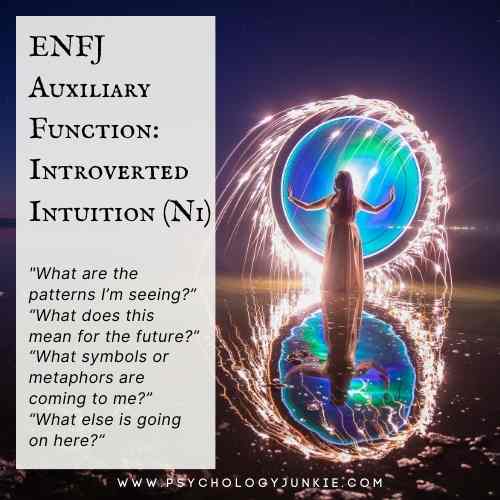
Auxiliary Function: Introverted Intuition (Ni) – ENFJs use this to second function to build rich inner visions of how things could be and to foresee implications and likely effects. They are forward-thinking and have a knack for seeing potential outcomes. This helps them guide others towards positive futures. An example of this would be in a team setting, where an ENFJ leader might anticipate a trend that could create an obstacle for the team’s plan in the future. They may be able to bring this up to their team and work out a way to circumvent the issue before it arises.
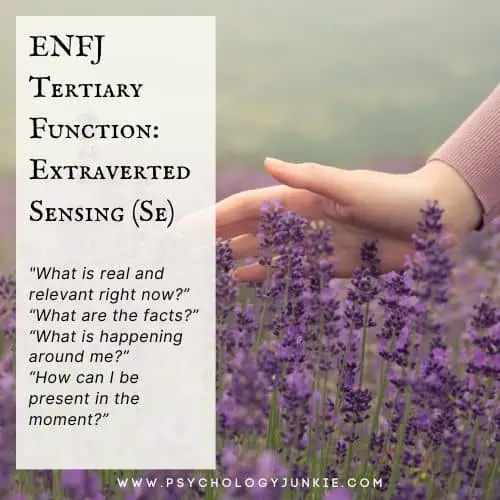
Tertiary Function: Extraverted Sensing (Se) – As their third function, Se helps ENFJs to be aware of the world around them and live in the present moment. It aids them in understanding the intricacies of their environment and adapting to it. Like noticing small changes in a person’s demeanor, which might indicate that something is wrong.
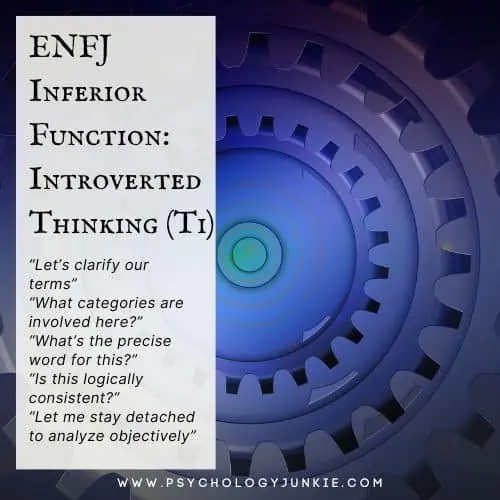
Inferior Function: Introverted Thinking (Ti) – As the fourth function, Introverted Thinking feels a little more difficult for ENFJs to use effectively. But even though it is weaker than the other three functions, it does help them make sense of the world by creating internal frameworks of understanding. For example, an ENFJ might use this function to understand the root cause of a social issue and work on ways to address it.
You can find out much more about the ENFJ’s specific cognitive functions in our article, A Look Inside the ENFJ Mind
What Stresses an ENFJ
ENFJs, despite their social adeptness and emotional intelligence, can often face stressors that can greatly impact their psychological well-being. They are not immune to the emotional turmoil of unmet needs and damaging environments, and certain situations can cause them significant stress.
- Conflict: ENFJs prefer harmony in their relationships. They tend to take disagreements or conflicts very much to heart.
- Neglect: If their efforts to maintain harmonious relationships are not reciprocated, or they feel their emotional needs are being neglected, they can feel overwhelmed and empty
- Criticism: Being criticized or feeling undervalued can be a great source of stress for an ENFJ, as they often put immense effort into pleasing others.
- Overload: ENFJs are notorious for over-committing themselves to others’ needs and can become overwhelmed if they feel they cannot meet these commitments.
- Ignoring Personal Needs: They have a tendency to put others’ needs before their own, which can lead to disregarding their own personal care, causing exhaustion or even illlness.
- Lack of Depth in Relationships: ENFJs yearn for meaningful connections and depth in their relationships. Surface-level or superficial interactions can leave them feeling disconnected and dissatisfied, adding to their stress levels.
- Extended Periods of Solitude: While they value their alone time for introspection and self-care, ENFJs are naturally social beings. Being alone for extended periods can make them feel isolated and even pessimistic.
- Overemphasis on Details: ENFJs typically focus on the bigger picture and concepts more than nitty-gritty details. Having to focus excessively on minute details can feel stifling and overwhelming because it forces them out of their natural perceiving mode and into one that requires a lot more energy.





